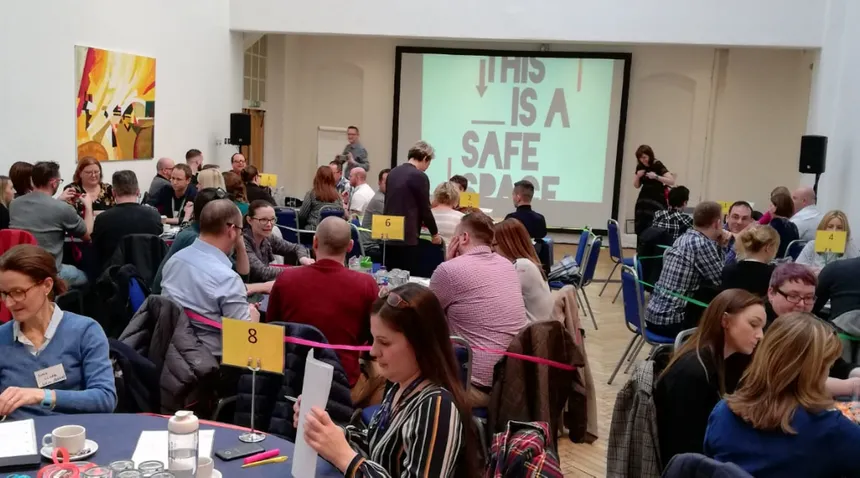Taking Care of Others, Taking Care of Ourselves

Originally published by Ian Baines – 7th March 2019
We all experience good and bad times within our working life. It is somewhat inevitable in the fast moving, high expectation world we inhabit these days. The good times bring real joy to our work but the bad can often impact with serious consequences – loss of confidence, burnout, stress and physical and mental ill health.
The concept of taking care of ourselves and those around us has therefore become a real focus for many organisations as they recognise the benefits of a healthy and happy workforce in terms of engagement and productivity. Wellbeing is becoming a central component of forward-looking organisations.
Can you imagine though dealing with extremely difficult, human based situations as part of your everyday work? Just think about what our emergency services (and clinical colleagues) may have to deal with on a daily basis. In this context we need to recognise the emotional and physical strain that we expect people in these roles to shoulder.
Organisations and individuals have therefore a responsibility to facilitate approaches that support individual and team wellbeing in such environments. It was against this background that people gathered at the #ProjectA Wellbeing Accelerated Design Event on 5th March in London.
The day focused on how we can create safe spaces and ensure wellbeing is embedded across all the ambulance trusts in the UK. It was noticeable that all ambulance services were represented on the day, signifying the importance of the subject matter.
The day was framed by Sasha Johnston from South West Ambulance and Gill Heuchan from London Ambulance. Whilst statistics are powerful persuaders – if all ambulance services achieved the sickness rate of the lowest ambulance service it would mean the equivalent of 1,000 extra people in the service – their emotion for the task at hand was evident. Simply put, neither ever want to see ambulance staff ‘broken’ by the pressures of their job.
“We don’t want to see staff broken, we want to encourage staff to talk about how they feel.”
Our three speakers in the morning were simply compelling – Anu Mitra (Imperial College Healthcare NHS Trust) talking about the impact of the Grenfell Tower disaster and the introduction of Schwartz Rounds at his Trust; Fiona Meechan (Royal College of Policing) and the development of the Compassion at Work Toolkit; and Esther Murray (Health Psychologist) with regard to the concept of moral injury and its applicability to medical and emergency services. The striking feedback from the room was about the similarities of the underlying principles from all three speakers:
- “It is ok not to be ok” (it is a factor of everyday human interaction);
- That we must have compassion for each other and be compassionate in our leadership;
- Creating time and resource are fundamental underpinnings of wellbeing; and
- A variety of approaches to wellbeing are necessary – truly one size does not fit all in the complexity of what people have to deal with.
Emboldened by the morning, the afternoon concentrated on good practice already in place in many ambulance services utilising the concept of a ‘market place’ for people to sell their ideas/practice (or in this case share and discuss).
Seven people made a pitch to host a table and the variety ranged from RUOK? in Scotland, Supervision in the South West to TRIM in Wales. The sharing and the feedback across all seven tables really encompassed one of the underlying principles of #ProjectA that connections and sharing are essential in creating improvement and change. Sometimes it is just a conversation with a like-minded individual that can provide the impetus to try something new.
As the day drew to a close we were all heartened to hear from Jason Killens , CEO of Welsh Ambulance who is one of #ProjectA’s sponsoring CEOs. Jason gave a commitment to driving the wellbeing agenda forward for ambulance services believing that the time was right for the Ambulance Association of Chief Executives (AACE) to find a concrete and tangible means of supporting wellbeing nationally whilst remaining true to local circumstances. The day had given him a number of potential ideas about how this could be accomplished and he was keen to talk through more with ambulance CEOs, AACE colleagues and NHS Horizons.
We ended the day though with a closing speech from the ‘frontline’, Yorkshire Ambulance Paramedic and Locality Manager John Isaac.
“Our passion should be that we care for each other and that you have time to care for yourself”
“Our passion should be that we care for each other and that you have time to care for yourself” John Isaac – Locality Manager (Paramedic) – Yorkshire Ambulance Service
TWEETS ON THIS SUBJECT
